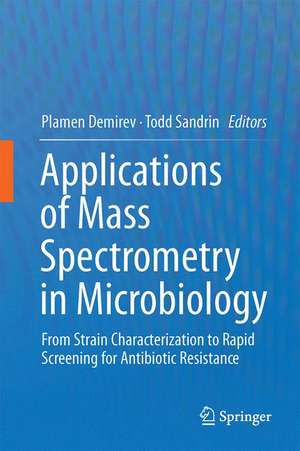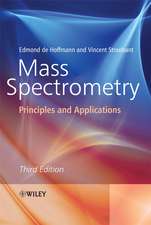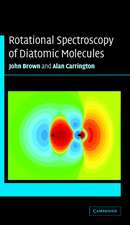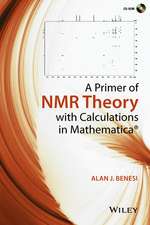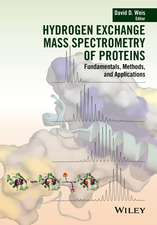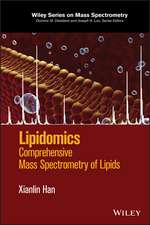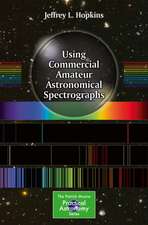Applications of Mass Spectrometry in Microbiology: From Strain Characterization to Rapid Screening for Antibiotic Resistance
Editat de Plamen Demirev, Todd R. Sandrinen Limba Engleză Hardback – 19 ian 2016
While previous work has covered broader approaches in using MS to characterize microorganisms at the species level or above, this book focuses on strain-level and subtyping applications. In twelve individual chapters, innovators, leaders and practitioners in the field from around the world have contributed to a comprehensive overview of current and next-generation approaches for MS-based microbial characterization at the subspecies and strain levels. Chapters include up-to-date reference lists as well as web-links to databases, recommended software, and other useful tools.
The emergence of new, antibiotic-resistant strains of human or animal pathogens is of extraordinary concern not only to the scientific and medical communities, but to the general public as well. Developments of novel MS-based assays for rapid identification of strains of antibiotic-resistant microorganisms are reviewed in the book as well. Microbiologists, bioanalytical scientists, infectious disease specialists, clinical laboratory and public health practitioners as well as researchers in universities, hospitals, government labs, and the pharmaceutical and biotechnology industries will find this book to be a timely and valuable resource.
| Toate formatele și edițiile | Preț | Express |
|---|---|---|
| Paperback (1) | 642.83 lei 6-8 săpt. | |
| Springer International Publishing – 30 mar 2018 | 642.83 lei 6-8 săpt. | |
| Hardback (1) | 649.06 lei 6-8 săpt. | |
| Springer International Publishing – 19 ian 2016 | 649.06 lei 6-8 săpt. |
Preț: 649.06 lei
Preț vechi: 763.60 lei
-15% Nou
Puncte Express: 974
Preț estimativ în valută:
124.21€ • 128.94$ • 103.57£
124.21€ • 128.94$ • 103.57£
Carte tipărită la comandă
Livrare economică 22 martie-05 aprilie
Preluare comenzi: 021 569.72.76
Specificații
ISBN-13: 9783319260686
ISBN-10: 3319260685
Pagini: 336
Ilustrații: VIII, 336 p. 68 illus., 36 illus. in color.
Dimensiuni: 155 x 235 x 21 mm
Greutate: 0.66 kg
Ediția:1st ed. 2016
Editura: Springer International Publishing
Colecția Springer
Locul publicării:Cham, Switzerland
ISBN-10: 3319260685
Pagini: 336
Ilustrații: VIII, 336 p. 68 illus., 36 illus. in color.
Dimensiuni: 155 x 235 x 21 mm
Greutate: 0.66 kg
Ediția:1st ed. 2016
Editura: Springer International Publishing
Colecția Springer
Locul publicării:Cham, Switzerland
Public țintă
ResearchCuprins
Introduction.- SECTION I. METHODOLOGY AND TECHNIQUES.- Methods and instrumentation in mass spectrometry for the differentiation of closely related microorganisms.- Sample preparation methods for the rapid MS analysis of microorganisms.- Advantages offered by proteomic strategies for rapid biodetection.- Bottom Up Proteomics Methods for Strain-Level Typing and Identification of Bacteria.- Maximizing the taxonomic resolution of MALDI-TOF-MS-based approaches to bacterial characterization: From culture conditions through data analysis.- SECTION II. SUB-SPECIES DISCRIMINATION.-
Modulation of the Discriminatory Power of MALDI-TOF MS Profiling for Distinguishing between Closely Related Bacterial Strains.- Discriminatory Power of MALDI-TOF Mass Spectrometry for Phylogenetically Closely Related Microbial Strains.- MALDI-TOF MS as a novel tool for dereplication and characterization of microbiota in bacterial diversity studies.- Bacterial Identification at the Serovar level by Top-down Mass Spectrometry.- SECTION III. DRUG RESISTANCE MONITORING AND ASSAYS.- Rapid profiling of human pathogenic bacteria and antibiotic resistance employing specific tryptic peptides as biomarkers.- Detection of β-lactamases and their activity using MALDI-TOF MS.- Stable-isotope based strategies for rapid determination of drug resistance by mass spectrometry.
Modulation of the Discriminatory Power of MALDI-TOF MS Profiling for Distinguishing between Closely Related Bacterial Strains.- Discriminatory Power of MALDI-TOF Mass Spectrometry for Phylogenetically Closely Related Microbial Strains.- MALDI-TOF MS as a novel tool for dereplication and characterization of microbiota in bacterial diversity studies.- Bacterial Identification at the Serovar level by Top-down Mass Spectrometry.- SECTION III. DRUG RESISTANCE MONITORING AND ASSAYS.- Rapid profiling of human pathogenic bacteria and antibiotic resistance employing specific tryptic peptides as biomarkers.- Detection of β-lactamases and their activity using MALDI-TOF MS.- Stable-isotope based strategies for rapid determination of drug resistance by mass spectrometry.
Notă biografică
Plamen A. Demirev, Johns Hopkins University Applied Physics Laboratory
Todd Sandrin, School of Mathematical and Natural Sciences, Arizona State University
Textul de pe ultima copertă
In the last quarter century, advances in mass spectrometry (MS) have been at the forefront of efforts to map complex biological systems including the human metabolome, proteome, and microbiome. All of these developments have allowed MS to become a well-established molecular level technology for microbial characterization. MS has demonstrated its considerable advantage as a rapid, accurate, and cost-effective method for microbial identification, compared to conventional phenotypic techniques. In the last several years, applications of MS for microbial characterization in research, clinical microbiology, counter-bioterrorism, food safety, and environmental monitoring have been documented in thousands of publications. Regulatory bodies in Europe, the US, and elsewhere have approved MS-based assays for infectious disease diagnostics. As of mid-2015, more than 3300 commercial MS systems for microbial identification have been deployed worldwide in hospitals and clinical labs.
Whileprevious work has covered broader approaches in using MS to characterize microorganisms at the species level or above, this book focuses on strain-level and subtyping applications. In thirteen individual chapters, innovators, leaders and practitioners in the field from around the world have contributed to a comprehensive overview of current and next-generation approaches for MS-based microbial characterization at the subspecies and strain levels. Chapters include up-to-date reference lists as well as web-links to databases, recommended software, and other useful tools.
The emergence of new, antibiotic-resistant strains of human or animal pathogens is of extraordinary concern not only to the scientific and medical communities, but to the general public as well. Developments of novel MS-based assays for rapid identification of strains of antibiotic-resistant microorganisms are reviewed in the book as well. Microbiologists, bioanalytical scientists, infectious disease specialists, clinical laboratory and public health practitioners as well as researchers in universities, hospitals, government labs, and the pharmaceutical and biotechnology industries will find this book to be a timely and valuable resource.
Whileprevious work has covered broader approaches in using MS to characterize microorganisms at the species level or above, this book focuses on strain-level and subtyping applications. In thirteen individual chapters, innovators, leaders and practitioners in the field from around the world have contributed to a comprehensive overview of current and next-generation approaches for MS-based microbial characterization at the subspecies and strain levels. Chapters include up-to-date reference lists as well as web-links to databases, recommended software, and other useful tools.
The emergence of new, antibiotic-resistant strains of human or animal pathogens is of extraordinary concern not only to the scientific and medical communities, but to the general public as well. Developments of novel MS-based assays for rapid identification of strains of antibiotic-resistant microorganisms are reviewed in the book as well. Microbiologists, bioanalytical scientists, infectious disease specialists, clinical laboratory and public health practitioners as well as researchers in universities, hospitals, government labs, and the pharmaceutical and biotechnology industries will find this book to be a timely and valuable resource.
Caracteristici
Comprehensive treatment of mass spectrometry, a tool at the forefront of bioanalysis that continues to grow The applications have wide appeal, from practitioners to public health professionals Contributions from a broad range of authors, encompassing all aspects of the field, will lend the volume a balanced and encyclopedic perspective? Includes supplementary material: sn.pub/extras
